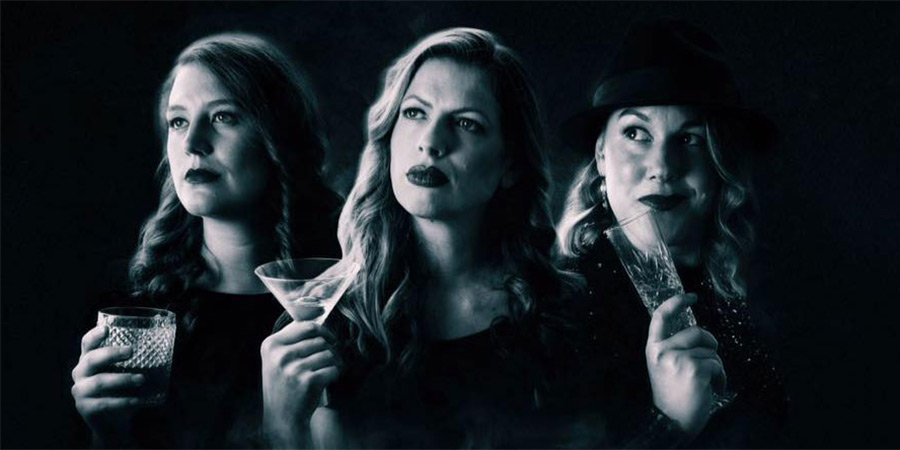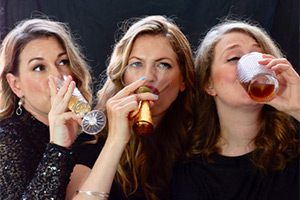Drunk Women Solving Crime television adaptation in the works

- Drunk Women Solving Crime is being adapted for television, with creators Hannah George, Taylor Glenn and Catie Wilkins executive producing
- The adaptation of the hit podcast is being made by True North Productions but will be hosted by higher-profile comedians
- Speaking ahead of the Drunk Women's largest Edinburgh Fringe run, Glenn said: "We don't want it to change wildly from what we've created because we know it works"
Drunk Women Solving Crime is being adapted for television, British Comedy Guide can exclusively reveal.
Hannah George, Taylor Glenn and Catie Wilkins are working with True North Productions (Gross Up) to bring their hit podcast to screens, with the news emerging as the trio prepare to appear at the Edinburgh Fringe in their biggest venue yet, with 10 nights at the nearly 300-seater Underbelly Cowbarn.
With a guest, usually a female comedian, one of the Drunk Women shares details of a historical crime and the others try to piece together exactly what happened while under the influence of alcohol. The guest also shares a story from when they've been a crime victim and a listener, or in the case of the live shows, audience member, disclose details of their experience.
"We've been approached by quite a few production companies about adapting the format for TV but we've always been really protective of it" Glenn told BCG. "One American producer was pitching these ideas that made it very clear he'd never listened to an episode.
"But [chief creative officer] Katy Thorogood at True North is fantastic. She's clearly listened, understood and gets the ethos of what we do and didn't just want to buy it from us and turn it into their own thing. She wants us involved, which is really important. There will have to be some tweaks to bring more of a visual aspect to television and the exact format is still up for grabs. But we don't want it to change wildly from what we've created because we know it works."
The Drunk Women are all former stand-ups who've chosen to focus on comedy writing in recent years, though Wilkins is just beginning to perform at gigs again. Their role in the potential television series will be behind the cameras, executive producing.
"It'll be with celebrities rather than us, we won't be on the show" Glenn clarifies. "And we're cool with that. We'd certainly like to be guests at some point. But the nature of this industry is that when you pitch anything you need high-profile people. We're not celebrities, so that fact that we've had a successful podcast is testament to how well it's done."
Conspicuously lighter in tone than most true crime podcasting, Drunk Women became a live show within two months of its launch in 2018 and bolstered its international following over lockdown.
They will be tailoring some of the stories for their Edinburgh run to the city's "grisly" past, with guests including local comics Pippa Evans and Jo Caulfield, as well as Catherine Bohart, Susie McCabe, Sooz Kempner and Paul Chowdhry.

With a London residency at 21Soho, "when we ask who listens to the podcast, 75% of the audience cheer, they're hardcore fans" Glenn explains. "But in Edinburgh, it's the opposite, we'll just get a small number who sit in the front row. A lot of people are taking a punt on the name and the artwork, they're intrigued by the branding, which is great. And we have noticed a spike in listeners after the Fringe."
She adds that she "still enjoys studio records because they give an opportunity to delve more into a case, have a bit more detail. But the live shows, the energy the audience brings is similar to stand-up, in that you're chasing the laugh a lot of the time. That's really fun and it keeps us on our toes."
Wilkins describes their fanbase as "quite a Wikipedia-type audience". If they get stuck on a difficult question, "someone will shout out the answer, there's never a lull. We had a doctor in the show the other day, dispensing medical advice. And obviously we get one of them up on stage at the end, so it can be quite interactive. Listening to the podcast, they can shout out in their kitchen. But live they can be garnering sympathy in the room."
Given the podcast's subject matter and the oft-repeated maxim that tragedy needs time to equal comedy, Drunk Women has "some loose ground rules" Wilkins explains.
"We do cover modern cases but they have to be quite light-hearted sort of heists, they can't be real tragedy. So we did an episode about Louis Pearlman, the Backstreet Boys' manager who stole all their money. He actually died before we did it but we weren't saying anything about that.
"We would never do a murder case with relatives still alive, it has to be Victorian, Edwardian or older. We're not the kind of podcast that plays 999 calls or anything dark and modern like that."
Infamously, Drunk Women Solving Crime was a title that Wilkins had even before they thrashed out the podcast's format at the pub. And she feels self-conscious arguing that there's "layers" to it, that there's "layers to the drinking, guys!
"It conjures up the camaraderie of friends on a night out" she maintains. "The atmosphere and the intimacy are a big part of it. It's clowning. Women aren't trusted to do anything, so drunk woman are the absolute worst. It's like a clown is doing this important job of being a detective. That's immediately funny and we're leaning into the prejudice."
Elaborating on their marrying of the silly and the deadly serious, Glenn suggests that "it's a comedy podcast but we tackle some real issues.
"Part of the idea was creating a safe space to ask if someone has been the victim of a crime. We've had everything, from the most light-hearted stuff to some pretty harrowing crimes and I think we've got pretty good at knowing where the line is in terms of when to mock something.
"We're empowering the person who's been through it, punching in the right direction, we're not being cavalier and inappropriate. And you can often see the inequality and lack of justice."
